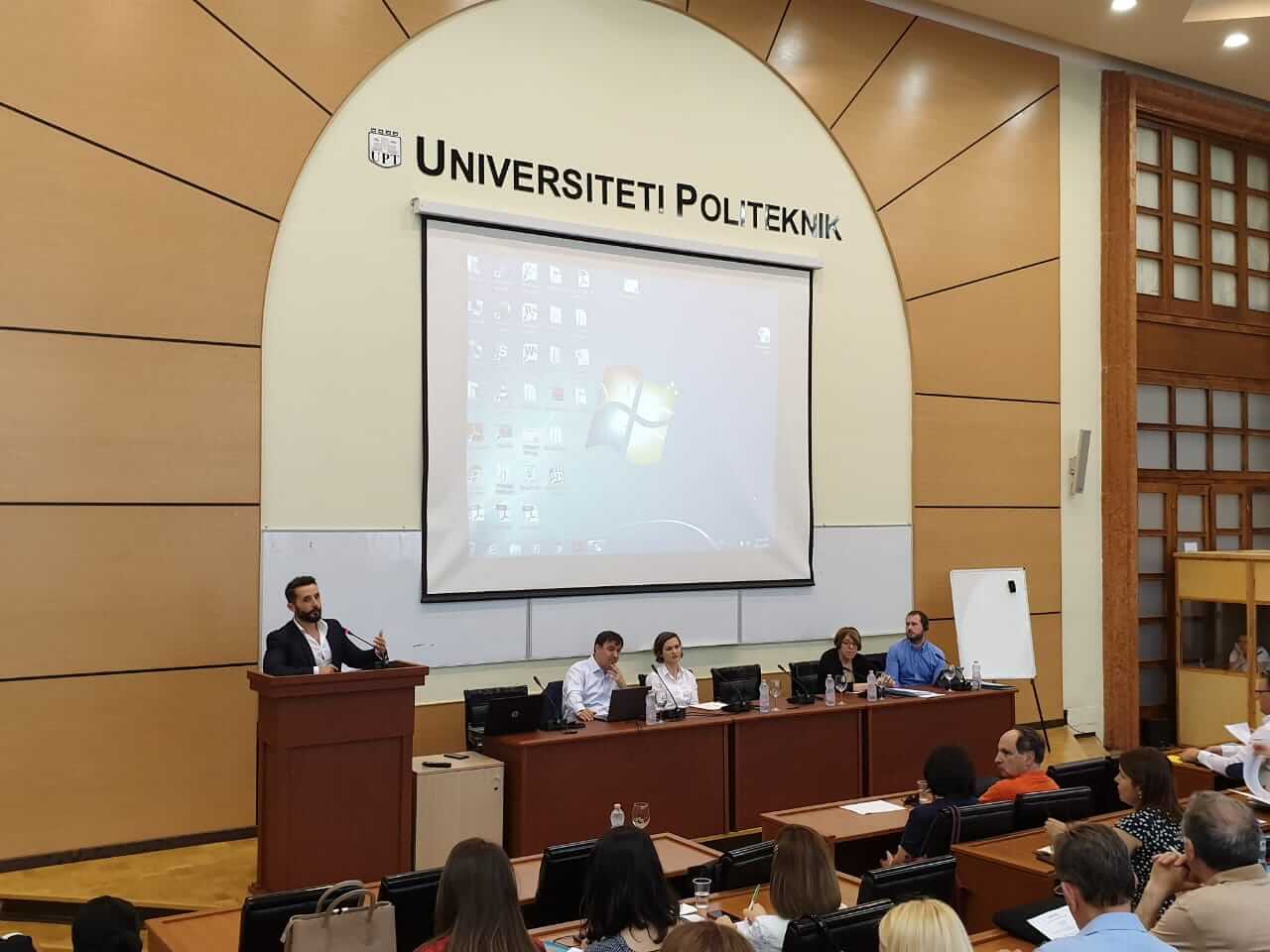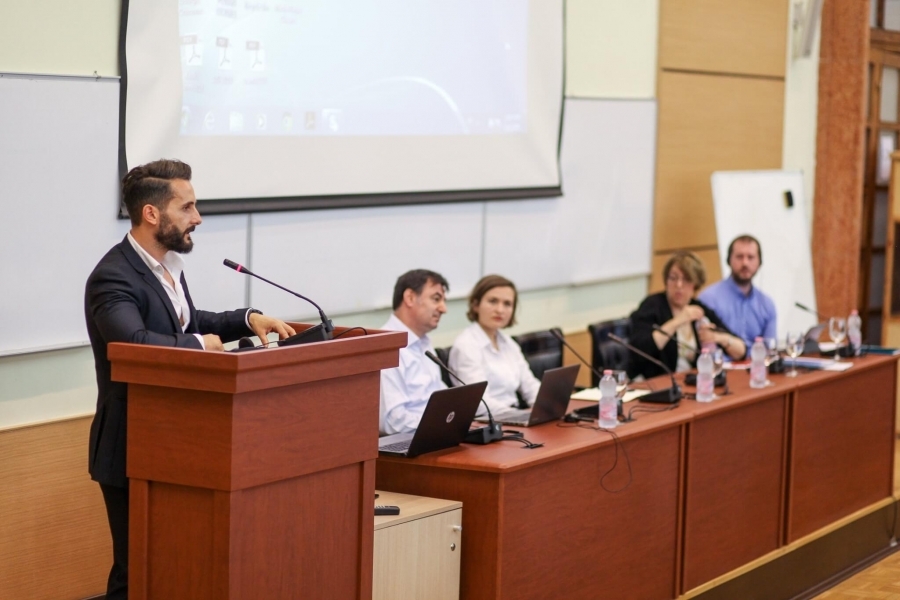Higher education quality experts from London School of Economics will help Albanian universities improve the quality of teaching. Director of the Agency for Quality Assurance in Higher Education (ASCAL), Mr. Elvin Gjevori Interview for Mapo newspaper: Accreditation will encourage public HEIs to improve quality.
The quality of teaching at Albanian universities is the "Achilles' heel". This is a concern raised by the experts, by the students themselves and also expressed by the Minister of Education, Sport and Youth herself Besa Shahini. But the ministry itself and the dependent agencies do not have a strategy how this reality can be changed, other than aiming to encourage universities themselves to increase quality.
To give an example or incentive to universities in this regard, the Agency for Quality Assurance in Higher Education (ASCAL), in collaboration with the Accreditation Board and the London School of Economics (LSE), organized a workshop on "Internal Security and Quality Improvement in Higher Education Institutions" in Tirana Polytechnic University. Minister Mrs. Shahini first spoke on the progress of the "University Pact" and the Albanian government's addressing of student demands such as: student fee subsidy; improvement of infrastructure; digital library; representation on the boards of management, as well as transparency in decision making. Regarding the quality requirements in teaching and integrity in research, Shahini emphasized that “Quality requirements in these fields should be addressed by the universities themselves. In this context, today's workshop the London School of Economics' quality education experts will help Albanian universities improve the quality of teaching and student education experience.

Will this meeting with the LSE serve to establish a longer-term agreement on British assistance in improving the quality of Albanian universities? The Director of the Agency for Quality Assurance in Higher Education (ASCAL), Mr. Elvin Gjevori, in an interview for the Mapo-Education supplement, says that such meetings enable Albanian university leaders to learn from world the best practices.
Mr. Gjevori says that the continuity of this process and its result rely on the universities themselves, being an autonomous process. He believes that the increase in quality will also be promoted by the accreditation of public HEI programs, which has just been launched by ASCAL.
Mr. Gevori, a few days ago ASCAL, in cooperation with the Accreditation Board and London School of Economics (LSE), organized a workshop on "Internal Security and Quality Enhancement in Higher Education Institutions". What feedback did you get from this workshop?
This workshop was organized in cooperation with the Accreditation Board in the framework of ASCAL's activities to enhance and ensure the quality of teaching in public HEIs in Albania. Currently the accreditation of study programs in public HEIs has entered a new dynamic stage where the Agricultural University of Tirana, the University of Sports, the University of Durres, the University of Korça and the University of Vlora are in different stages of their study programs first accreditation. The University of Tirana will soon undergo this process too. Thus, as the accreditation process has entered a new phase, such dynamic and more advanced activities are necessary and will be intensified in order to institutionalize control structures and increase quality especially in terms of teaching.
The workshop was attended by Vice. Rectors for the teaching process, heads of quality control offices, institutional accreditation coordinators and lecturers. During the presentations and discussions there was an exchange of views on international best practices for quality assurance and enhancement as well as the most appropriate ways to implement them in Albania. Equally important, this meeting provided key individuals from various HEIs in Albania with the task of enhancing and providing quality teaching to share the experiences, successes and difficulties they encountered in order to create a community of experts in our higher education system for quality assurance. The speakers at the workshop were: Dr. Arjan Gjonça - Chairman of the Accreditation Board, who made a presentation on the topic: "Assessing Academic Performance in the UK and LSE"; Dr Claire Gordon - Director of the Center for Teaching and Learning at London School of Economics, who gave a presentation on "Improving the Quality of Teaching at LSE and the Higher Education System in the UK"; Thomas Hewlett - Director of the Office of Quality Assurance in Teaching at the London School of Economics, who gave a presentation on: "Quality Assurance of Teaching at LSE and the Higher Education System in the UK" and Besart Kunushevci - Platform Academy, who gave a presentation on the topic: "Implementation of Anti-plagiarism System in Albanian HEIs".
The participants highly appreciated this activity and requested that it be held again in the future with speakers of international caliber to bring international best practices as well as practical tips on how these practices could be implemented in Albania. However, it should be noted that the implementation of these practices will require time and a considerable amount of resources, and the HEIs themselves are the main actors in this process. ASCAL and other central institutions can assist in this process, but at the end of the day it is a task for the HEIs.
Is there an agreement between your agency and the LSE to pursue further training at Albanian universities? So will there be random workshops or is there a follow-up plan for training public university leaders?
ASCAL cooperates with a number of international partners as a member of ENQA and a number of other international groupings of external quality assurance institutions. The collaboration with the LSE was facilitated by the Chairman of the Accreditation Board, Professor Arjan Gjonca, who is also a professor at LSE for many years. We believe that this cooperation will continue and we are working to further strengthen it. We will also work with other partners to bring as much information and knowledge as possible to create as many links as possible between our HEIs and international partners in order to continually increase the quality and meet student requirements.
Why did you choose LSE for this expertise?
The LSE is an elite international institution from which not only us but also consolidated institutions have something to learn. Also as higher education law is based on the Anglo-Saxon model, it makes even more sense to collaborate with institutions such as the LSE. For us, this collaboration is an honor and we are very proud as it enables our public HEIs, at no additional cost, to access international best practices. In the future, in consultation with the HEIs and in coordination with the Accreditation Board we will continue such trainings and workshops on more specific topics until we have established consolidated quality assurance structures.
What did the British experts find out, what was the problem in the Albanian universities according to them?
The purpose of the experts was not analyzing the system in Albania, thus they did not make any specific findings. But as good professionals of the quality assurance system and good aquatinters of Albania and the region, they presented the potential difficulties Albania could face, difficulties they themselves faced, and possible ways to solve them. The aim of such activities is not to get fixed prescriptions, but to equip the interested parties with knowledge, consolidated practices and previous experiences that are used to address the day-to-day difficulties faced by decision makers in the field of quality assurance.
So we neither sought nor were offered 'magical solutions' but tested mechanisms that could be put to use by our public HEIs to ensure and enhance the quality of teaching. In this context, LSE experts showed us how LSE teaching is done, how teachers are evaluated and how students are involved in the process. All of these are key elements for improving the quality of teaching in Albania.
But has ASCAL done any research, do you have any reports of problems with the quality of teaching and a strategy on how these problems will be improved?
Being that ASCAL is the only agency responsible for external evaluation and institutional and study programs accreditation we have a lot of data regarding the problems observed at institutional and program level. In this context we have also conducted activities and publications where these issues were identified. Finally, and for the first time in Albania, we have also conducted the National Student Survey, where all students in Albania have had the opportunity to evaluate the institution where they study. Soon we will publish the preliminary data of the Survey on Public HEIs, which will address all the problems of the higher education system from the students' point of view. This data will constitute an additional element in the arsenal of data available to HEIs to improve the academic services they provide to their students.
One of the concerns raised at the student protest was the level of teaching. Students complain about the low level of lecturers, poorly translated or poorly written books, corruption, etc. What is being done under the “University Pact” to change this perception?
As I said above we will soon release the preliminary data of the National Student Survey and there is a lot of interesting data on these issues as well. You will notice that student perceptions are much more nuanced and layered than the general public thinks. However, when the data is public we can talk again and discuss at length.
What I can say now is that our HEIs have a lot of work to do to enhance the quality of teaching. But this should come internally from the HEIs themselves, as they have full autonomy in this area and have a primary responsibility in this task. ASCAL has its role to play in this by accrediting the study programs for public HEIs, which have just been started. I am confident that with the expansion of accreditation of study programs the quality of teaching will increase. But we have to consider that this is a slow process and not an easy one. However, I repeat that these issues should be addressed first and foremost by the HEIs themselves. ASCAL can help as we did through this workshop, but the main burden lies with the universities themselves.



